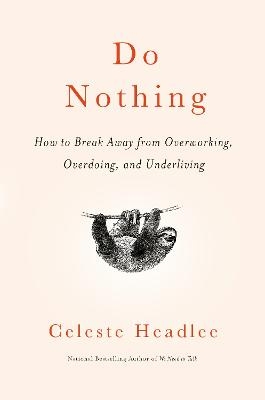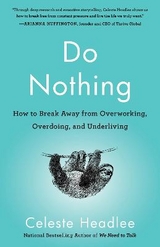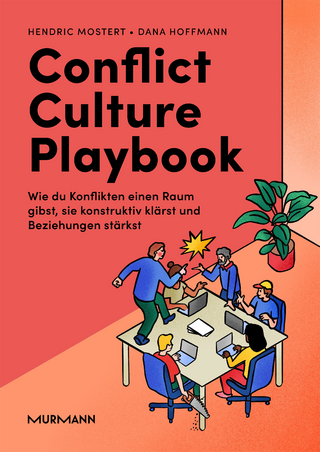
Do Nothing
Harmony Books (Verlag)
978-0-593-13893-9 (ISBN)
- Titel erscheint in neuer Auflage
- Artikel merken
"This book is so important and could truly save lives."-Elizabeth Gilbert
"A clarion call to work smarter [and] accomplish more by doing less."-Adam Grant
We work feverishly to make ourselves happy. So why are we so miserable?
Despite our constant search for new ways to optimize our bodies and minds for peak performance, human beings are working more instead of less, living harder not smarter, and becoming more lonely and anxious. We strive for the absolute best in every aspect of our lives, ignoring what we do well naturally and reaching for a bar that keeps rising higher and higher. Why do we measure our time in terms of efficiency instead of meaning? Why can't we just take a break?
In Do Nothing, award-winning journalist Celeste Headlee illuminates a new path ahead, seeking to institute a global shift in our thinking so we can stop sabotaging our well-being, put work aside, and start living instead of doing. As it turns out, we're searching for external solutions to an internal problem. We won't find what we're searching for in punishing diets, productivity apps, or the latest self-improvement schemes. Yet all is not lost-we just need to learn how to take time for ourselves, without agenda or profit, and redefine what is truly worthwhile.
Pulling together threads from history, neuroscience, social science, and even paleontology, Headlee examines long-held assumptions about time use, idleness, hard work, and even our ultimate goals. Her research reveals that the habits we cling to are doing us harm; they developed recently in human history, which means they are habits that can, and must, be broken. It's time to reverse the trend that's making us all sadder, sicker, and less productive, and return to a way of life that allows us to thrive.
Celeste Headlee is an award-winning journalist and professional speaker, and is the bestselling author of We Need to Talk: How to Have Conversations That Matter. She is cohost of the new weekly series Retro Report on PBS and season three of the Scene on Radio podcast-MEN. Celeste serves as an advisory board member for Procon and the Listen First Project. In her twenty-year career in public radio, Celeste has been the executive producer of On Second Thought at Georgia Public Radio and has anchored programs including, Tell Me More, Talk of the Nation, All Things Considered, and Weekend Edition. She also cohosted of the national morning news show The Takeaway for PRI and WNYC, anchored World Channel's presidential coverage in 2012, and received the 2019 Media Changemaker Award. Celeste lives in Washington, DC.
Introduction It will be said that, while a little leisure is pleasant, men would not know how to fill their days if they had only four hours of work out of the twenty-four. In so far as this is true in the modern world, it is a condemnation of our civilization; it would not have been true at any earlier period. There was formerly a capacity for light-heartedness and play which has been to some extent inhibited by the cult of efficiency. The modern man thinks that everything ought to be done for the sake of something else, and never for its own sake. - BERTRAND RUSSELL, "In Praise of Idleness," 1932 We answer work emails on Sunday night. We read endless articles about how to hack our brains to achieve more productivity. We crop our photos and use filters before we post them on social media to earn approval. We read only the first couple paragraphs of the articles we find interesting because we don't have time to read them in their entirety. We are overworked and overstressed, constantly dissatisfied, and reaching for a bar that keeps rising higher and higher. We are members of the cult of efficiency, and we're killing ourselves with productivity. The passage at the beginning of this Introduction was written in 1932, not long after the stock market crash of 1929, which caused the Great Depression. Russell's description of the "cult of efficiency" predates World War II, the rise of rock and roll, the civil rights movement, and the dawn of the twenty-first century. More important, in my mind: It was written before the creation of the internet and smartphones and social media. In other words, technology didn't create this cult; it simply added to an existing culture. For generations, we have made ourselves miserable while we've worked feverishly. We have driven ourselves for so long that we've forgotten where we are going, and have lost our capacity for "light-heartedness and play." Here's the bottom line: We are lonely, sick, and suicidal. Every year a new survey emerges showing more people are isolated and depressed than the year before. It's time to stop watching the trend move in the wrong direction while we throw up our hands in despair. It's time to figure out what's going wrong. All my life, I've been driven. That word has been used to describe me since elementary school. Driven isn't always a compliment, especially when it's used to describe a woman. It's not quite the same as ambitious, and it has a slightly different meaning than aggressive. Honestly, I think driven fits me fairly well. I've always viewed all forward progress as inherently virtuous and good. Even as a child, I made long to-do lists in my daily planner (I had a daily planner by the ripe old age of twelve) and made sure I finished more tasks than I added every day. When I was dieting, I motivated myself by saying I would weigh less tomorrow than today, even if it was only by a fraction of an ounce. If I spent an afternoon watching monster movies on TV, I felt guilty. I was terrified that someone would see me sitting idly on the couch and call me lazy. My drive has helped me succeed in life. It sustained me through single parenthood, layoffs, and physical injury. I've pushed myself to accomplish incredible amounts of work both at home and in my career. But at some point, drive became inextricably intertwined with dread: dread that all my work and effort would never be enough. Eventually, I got lucky. I achieved much of what I wanted by the time I hit my forties, and I had time to stop, take a breath, and reexamine my way of life. While I'd always been driven, I'd also been exhausted, stressed, and overwhelmed. I assumed depletion was a natural side effect of being a single parent with multiple jobs and not enough money to cover all my expenses. My underlying assumption was that when I achieved financial stability, my stress would end. That assumption, like so many assumptions, was w
| Erscheinungsdatum | 14.03.2020 |
|---|---|
| Sprache | englisch |
| Maße | 140 x 211 mm |
| Gewicht | 283 g |
| Themenwelt | Sachbuch/Ratgeber ► Beruf / Finanzen / Recht / Wirtschaft ► Bewerbung / Karriere |
| Sachbuch/Ratgeber ► Gesundheit / Leben / Psychologie ► Lebenshilfe / Lebensführung | |
| Geisteswissenschaften ► Psychologie ► Sozialpsychologie | |
| Sozialwissenschaften ► Ethnologie ► Volkskunde | |
| Sozialwissenschaften ► Soziologie | |
| Schlagworte | Anxiety • anxiety relief • Burn out • Burnout • goals • Happiness • how to • how to do nothing • How to fail • how to relax • IDLE • leisure time • Meaning • Mental Health • Mindfulness • Nothing • overwhelmed • Personal Growth • priorities • Productivity • Psychology • reconnect • Relax • Relaxation • relaxation gifts • relaxation gifts for women • Rest • Schedule • self care • Self Help • self help books • self improvement books • self worth • shorter work week • Sociology • Strain • Stress • stress relief • Technology • Thrive • Time Management • unplug • Well being • workplace culture |
| ISBN-10 | 0-593-13893-7 / 0593138937 |
| ISBN-13 | 978-0-593-13893-9 / 9780593138939 |
| Zustand | Neuware |
| Haben Sie eine Frage zum Produkt? |
aus dem Bereich



